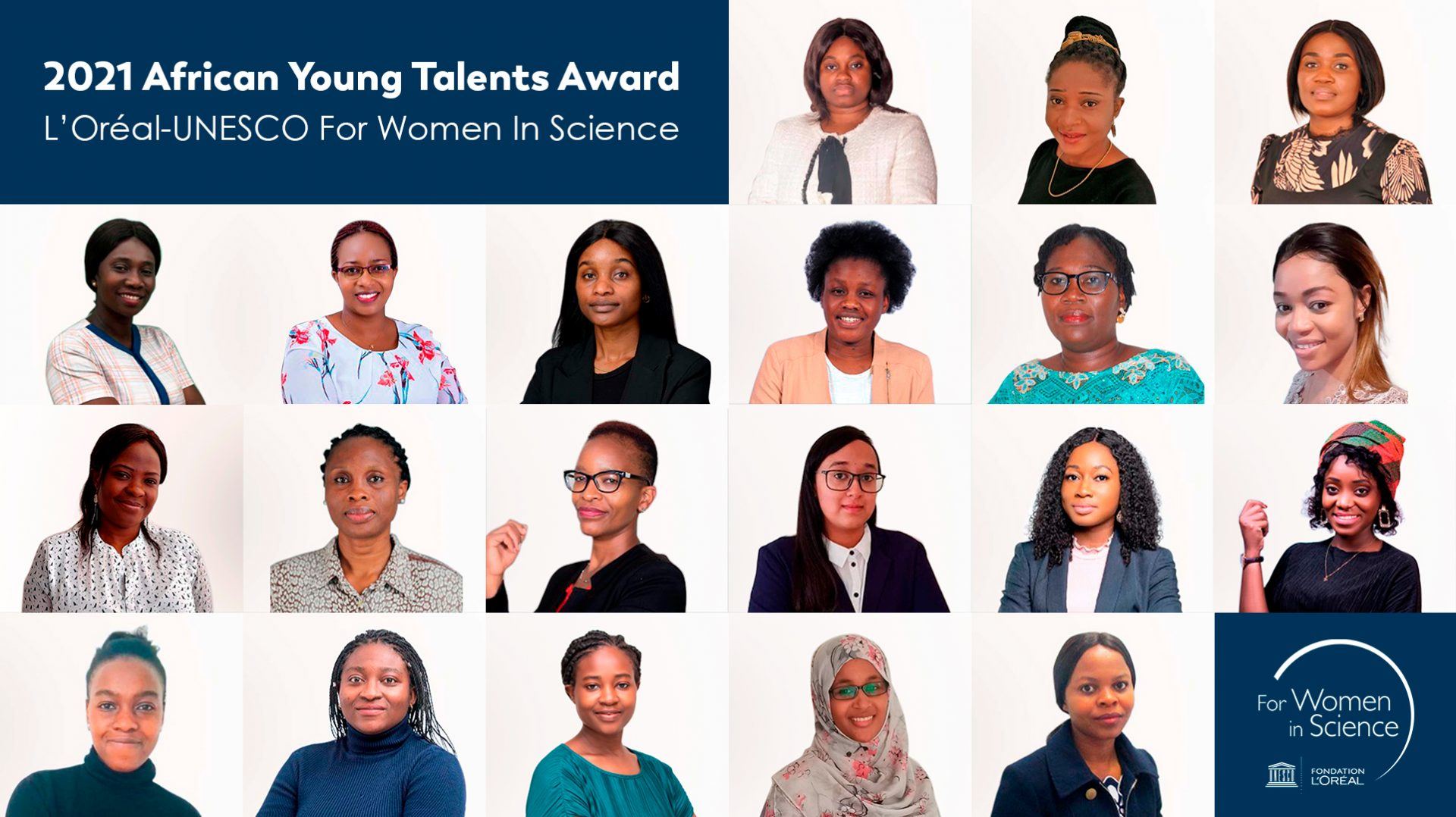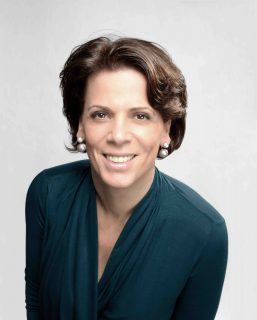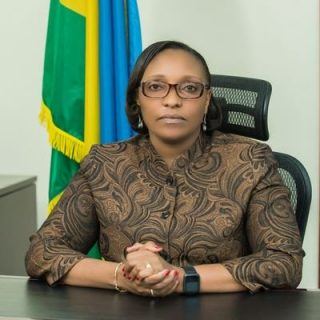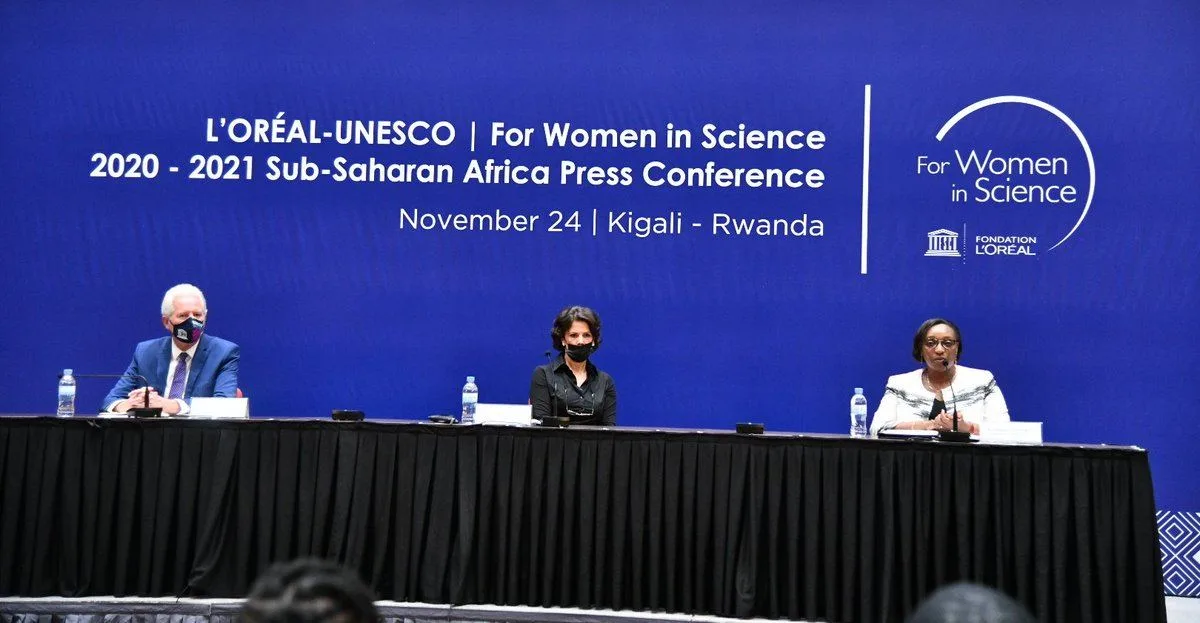Kigali, 25th November 2021: Tonight the Fondation L’Oréal and UNESCO will reveal the laureates of the 12th edition of the For Women in Science Young Talents Award for Sub-Saharan Africa. This program rewards twenty young African women scientists for the excellence of their research. For the 2021 edition, the 15 PhD students and 5 postdoctoral students awardees come from 17 countries and embody, through their backgrounds and research topics, all the diversity and potential of African science for today and tomorrow. Longevity reports.
African women scientists are key for the future
The Jury of the L’Oréal-UNESCO For Women in Science Sub-Saharan Africa Young Talents Awards 2021, chaired by Pr Aggrey Ambali, Director of Technical Cooperation and Program Financing at the African Union Development Agency (AUDA-NEPAD), selected these 20 Young Talents among nearly 440 applications. For the first time since the inception of the Awards, young talents from Eswatini (formerly Swaziland) and Gabon are present in the final list of awardees.
Meet the 20 Young Scientists from Sub-Saharan Africa

Speaking at a press briefing last night, Alexandra Palt, L’Oreal Chief Corporate Responsibility Officer and Executive Vice President of the Fondation L’Oréal explained why the awards are so critical.
Palt said the programme For Women in Science and Young Talent Awards Sub-Saharan Africa improves the visibility of women scientists, creates more role models and helps break through glass ceilings.
Covid Pandemic has Compromised Women’s Rights
 “Covid is a backlash for women’s rights all over the world. Girls have left school, there have been more child marriages, gender-based violence and poverty have had a more female face. It’s normal, when you have a gender unequal society, that such a crisis will increase inequality.”
“Covid is a backlash for women’s rights all over the world. Girls have left school, there have been more child marriages, gender-based violence and poverty have had a more female face. It’s normal, when you have a gender unequal society, that such a crisis will increase inequality.”
This is why it is even more important than before to support the development of women. In this regard, the For Women in Science programme seeks to make more women in science visible and powerful. Despite Covid challenges, the Fondation L’Oréal and UNESCO agreed the event should take place. Kigali, the capital of Rwanda, has the chosen location for the five-day programme.
Women in Science impacted by the Covid crisis
Palt said she was further concerned that it was not just women in general who became invisible during Covid, but female researchers have been less visible over the pandemic.
The statistics are alarming
“We at the Foundation have seen evidence that women scientists published less because during lockdown they had more responsibilities at home, which led to less productivity. And that is dangerous for women, for science and society in general.”
The role of science is so important in determining the future of climate change, health, infrastructure, public enterprise, and the economy in general. Women cannot be left out, yet the statistics tell a shocking story.
“Female researchers account for only 33%, of all worldwide, and even less from Africa – 0.6% according to the last UNESCO report. When we look at more senior positions with more responsibility, women are even less visible – around 15 % in high level positions, and just 4% have received the Nobel Peace Prize since the inception. Can you imagine? – Alexandra Palt
“We have to put women at the forefront, visible. The world needs science and science needs women. “
Training and skills improvement
Over the last four days, 20 young scientists have been trained in additional skills that will help them break through the glass ceiling, negotiation skills, management, leadership, media training, and skills that complete their scientific excellence in order to help accelerate their careers. Palt said this is very important for the continent as the issues are all bigger than ours. Health, disease, anti-biotic resistance, malaria, HIV, biodiversity loss, restoration, and sustainability are critical issues scientists need to help overcome.
“The world of tomorrow cannot just be designed by male researchers. We need women to be part of designing solutions sustainability and technology, AI, for the world we want to create for tomorrow.”
Science needs women
 Professor Hubert Gijzen UNESCO regional director came out in full support of Alexandra Palt’s sentiments. He repeated, “The world needs science, and science needs women, to say it all.” He then posed three questions.
Professor Hubert Gijzen UNESCO regional director came out in full support of Alexandra Palt’s sentiments. He repeated, “The world needs science, and science needs women, to say it all.” He then posed three questions.
- Why Science? Let’s face it, past years have not been easy for science. Science is under pressure and under continuing pressure today.
“Be it on the issue of climate change, governmental issues, or the Covid-19 pandemic and every time it has been an inconvenient truth that has been communicated by science.”
“Most people use the information with appreciation, and turn it into positive action, and some apparently cannot do it. Instead, they go in denial and even go as far as attacking science. And that is very dangerous.
The irony is that today, the world needs more scientists than ever before to catalyze the global green and digital transformation and all the sectors Alexandra Palt referred to and also the important international agendas. Here in Africa, we have the visionary AU Agenda 2063, to achieve this we need more science and better science. This is reflected in UNESCO’s Science report. This report is freely downloadable on our website. Click here: The Race Against Time For Smarter Development.”
UNESCO has adopted a new policy on open science, an important step. We still only have 0.6% scientific female researchers in Africa, even though fifteen years ago we agreed to 1% It is still low.
2. Why Women?
There are 14 million students enrolled in higher education, which is 6.4% of the global student population. That is wrong because the population in Africa is about 15% of the world total. So it is too low. If you look at how many are in science, it is only one-third, and then we come to the worst part of the story, how many women? It starts well at M.Sc. and BSC, more gender balanced, but we lose women when it comes to PhDs and further lose them when they go into the labour market. We need to do better there.
Gender equality is everyone’s business
In the contemporary sciences like AI, only 22% of professionals are women. Gender equality is everyone’s business. It is persistent. 95% of the Fortune 100 CEOs are men. 95% of all flights around the world are piloted by men. 5 out of 100 aviation technicians are women and so on.
Why focus on women?
- We are under utilizing the world’s intellectual potential and capacity
- We have low capacity, and we need more resources, women must fill this
- An MIT study found gender-balanced teams are more productive and profitable. It’s a no brainer
3. What are we doing about it?
“We at UNESCO, have to think and provide interventions much earlier in the educational spectrum. We also need to re-pitch the image that science has People believe, science is only for nerds, more difficult, boring, not paid well which keeps young people out of science. S0 how do we bring science to the classroom.”
It’s important to make science exciting. “The way we bring science to the classroom camps, that are attractive, fun. Among many intiatives Gijzen quoted, UNESCO recently launched the One Million Girls in STEM campaign around the world, with an emphasis on Africa. Women for Science, is a flagship programme.
I personally consider this programme highly strategic because it recognises women for their scientific achievements, but also stimulates their continued engagement. Strategic because the most important because it promotes. young talented women in science as role models for younger girls. It has a catalytic function. – Professor Hubert Gijzen UNESCO
Education from youth is key
Hosting and honoured guest at the media conference, the Minister of Education Dr. Valentine Uwamariya, for the Republic of Rwanda, acknowledged the important role of women in science. An acclaimed academic in her own right, she shared how the Rwandan government had made significant progress in uplifting women, socially, politically, and economically.
 She further stressed the importance of young girls starting from an early age to aspire to a better life. The government of Rwanda is committed to gender equality across all sectors. “We have Rwandan scientists here that are role models for the youngsters. I am also a scientist and it is clear it is possible.”
She further stressed the importance of young girls starting from an early age to aspire to a better life. The government of Rwanda is committed to gender equality across all sectors. “We have Rwandan scientists here that are role models for the youngsters. I am also a scientist and it is clear it is possible.”“You cannot become a scientist if you do not have access to education.” – Minister of Education Dr. Valentine Uwamariya, Republic of Rwanda
Powerhouses for the African Continent
The Young Talents from this year testify to the fact that African women scientists are a critical asset for the development of the continent. Driven by their commitment, they stand out for their excellence in their respective fields: from chemistry to virology, biology, neurology, and nuclear physics. Through their research, they make an important contribution to improving the living conditions of millions of people throughout Africa and the world.



![women [longevity live]](https://longevitylive.com/wp-content/uploads/2020/01/photo-of-women-walking-down-the-street-1116984-100x100.jpg)










